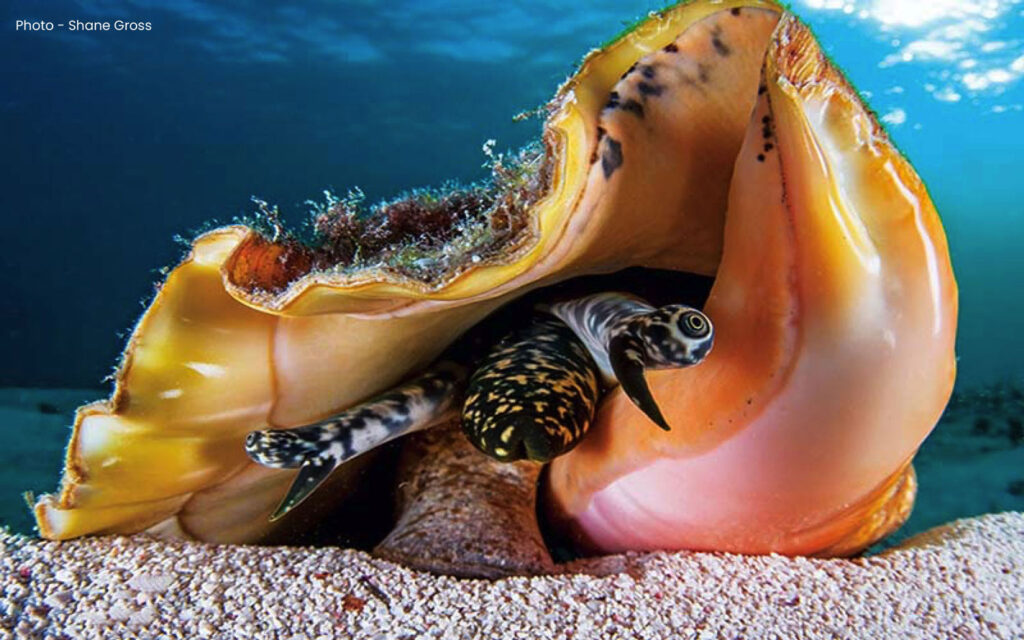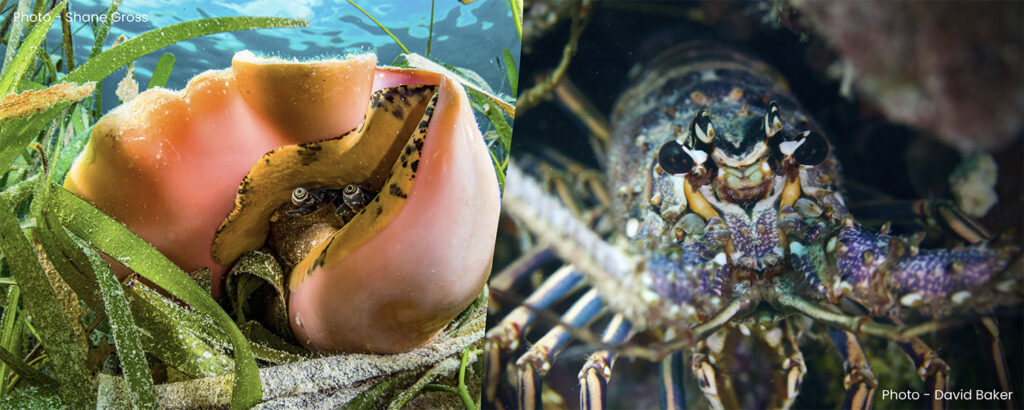Corals often steal the spotlight for being visually stunning while also playing a critical role in maintaining the balance of our oceans. But there are other fascinating creatures that also significantly support the vitality of the underwater wonderland. Among them, lobsters and conchs stand out as key players.
Why Lobsters and Conchs?
Lobsters are found in various oceans around the world, but conchs – large marine snails also known as queen conchs – inhabit tropical waters. Both are equally ecologically important for coral reef ecosystems.
Here’s how they do it…
- Algae Control – Lobsters and conchs control algae populations on coral reefs, preventing overgrowth that can smother corals and hinder their growth. Their grazing activities help maintain a healthy balance between corals and algae, promoting the survival and dominance of corals.
- Food Chain Dynamics – A crucial link in the food chain, lobsters regulate the populations of smaller organisms such as crabs and sea urchins which prevents imbalances in the coral reef ecosystem. Both lobsters and conchs serve as prey for larger predators, supporting biodiversity and the stability of the food web.
- Habitat Engineering – Some lobster species, like the Caribbean spiny lobster, create burrows and crevices that provide shelter for other reef inhabitants. These structures enhance biodiversity and provide refuge for small fish and invertebrates, contributing to the complexity and resilience of reef ecosystems.
- Sediment Stabilization – Conchs help stabilize sediment by burrowing into it, preventing excessive accumulation that could smother coral colonies. This activity improves water circulation and maintains a suitable sediment environment for coral growth.

Thanks to their roles as herbivores, predators and prey, and habitat engineers, these key players contribute to the overall biodiversity and resilience of reefs. This is why CORAL and our local patterns are working diligently to protect them in the Bay Islands of Honduras where protective fishing rules and regulations are in place, but unfortunately are not always abided by the fishing community due to social and economic pressures.
Actions We’re Taking
Preserving lobsters and conchs is crucial for the long-term health of reef ecosystems, but their populations have been declining due to overfishing and a lack of effective regulation. To help address these issues, CORAL’s Western Caribbean team is advancing fisheries research and management strategies for lobster and conch made possible by a grant financed by Ingvar Bundgaard Jensen Fund.
This project aims to comprehensively assess the status of both the Caribbean spiny lobster (Panulirus argus) and the queen conch (Strombus gigas) in the Bay Islands of Honduras as well as to develop management strategies for their long-term protection.
The structure of this project recognizes the importance of engaging fishers and communities in management decisions in order to improve the social and economic circumstances of coastal communities. By tackling this intersection of marine conservation and livelihood sustainability, CORAL helps safeguard the health of coral reefs for the benefit of both marine life and coastal communities.
Shaping The Future
Through this initiative, CORAL will support co-managers with ground-truthed science. This will help them make well-informed decisions to improve coral reef management, benefit local communities, increase awareness of sustainable fishing practices, and enforce fishing regulations. CORAL scientists, alongside local partners, will be surveying the Bay Islands, revising marine species monitoring protocols, and collaborating with the patrols of the Bay Islands National Park (a marine protected area). We will also be creating detailed population hotspot maps that will serve as valuable tools for spatial management, engaging youth in monitoring, and providing capacity-building actions for local partners and marine managers.
By enhancing the monitoring and enforcement of fishing regulations, we expect to reduce illegal fishing and promote more compliance with sustainable fishing practices. The expected outcomes also include maintaining or increasing lobster and conch populations, spreading understanding of location-specific threats and interventions, involving local schools and organizations, and making science-based recommendations for policy changes that can positively impact fisheries and the Bay Islands National Park.
This project strives to encourage fishing communities in the Bay Islands to adopt sustainable fishing practices, leading to a decrease in overfishing and an increase in lobster and conch populations. By providing economic benefits for nearly 5,000 people involved in small-scale fisheries, CORAL seeks to facilitate an improvement in the well-being and livelihoods of roughly 14,000 local beneficiaries dependent on coral reefs in the face of climate change.

Coming Soon: Lobster and Conch Monitoring Protocol
To address issues of overfishing in this region, CORAL and key collaborators from the Bay Islands National Marine Park Technical Committee – such as the ICF Honduras: National Institute of Forest Conservation, Bay Islands Conservation Association (BICA), Roatan Marine Park, and others – recently developed a guide for the unified monitoring and evaluation of these key species in the MPA. The protocol emphasizes the regular monitoring of lobster and conch populations, as well as their habitats. Collaborative research efforts enable scientists to better understand the ecological dynamics and make informed decisions for sustainable management.
Through comprehensive studies, community engagement, and sustainable management practices, we hope that this protocol will safeguard Caribbean spiny lobsters and queen conchs for the long-term benefit of both the fisheries and the livelihoods of the communities in the Bay Islands.
Get Involved
Lobsters and conchs may not receive as much attention as corals when discussing reef ecosystems, but their ecological significance cannot be underestimated. As key players in food chain dynamics, habitat engineering, algae control, and sediment stabilization, these fascinating creatures play a crucial role in the overall health and resilience of coral reefs.
By initiating this research project, effectively implementing the protocol, and adhering to sustainable practices, we – along with the fishing and marine conservation communities – can ensure the continued survival and abundance of lobsters and conchs, ultimately safeguarding the remarkable beauty and biodiversity of our precious reef environments for future generations.
You can directly support this initiative by clicking below. And stay tuned for the official protocol document, set to be published in the near future.

